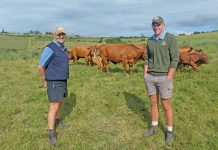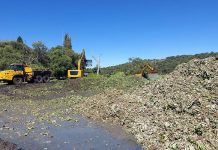The feeling IN organised AGRICULTURE, as well as other concerned public groups, is that the regulations in the Expropriation Bill will be steamrolled into law by the end of June. TAU SA’s president Paul van der Walt said it was unclear how serious the government’s intention was to invite public comment on the Bill because it wasn’t published in the Government Gazette and invitations to comment were only advertised in the media. “Based on information provided to us, the publication of the notice inviting comment was also done over a weekend (25 April to 27 2008), so few farmers had access to such newspapers,” Van der Walt said.
In addition, the scheduled public hearings regarding the Bill have been organised to take place in rural areas – localities that will make it difficult for organisations that have studied the Bill extensively to attend and participate in open debate.
While the Bill aims to replace the Act of 1975 to bring it more in line with the constitution, the Institute for Race Relations (IRR) said this could have been achieved by simply adding two clauses to the existing Act.
The first would grant the Public Works minister the ability to expropriate in the public interest as well as for public purpose. The second would be to add in four factors from the property clause in the constitution that are missing in the current Act. These include the current use of the property, history of its acquisition, any state subsidy used in its acquisition or improvement and the purpose of the expropriation. According to the IRR, compensation would then be based on these four factors and include market value, loss suffered and additional solatium.
However, if the Bill is passed, it will make it possible for all organs of state from municipalities up to expropriate land. While it ‘s been made clear in a policy paper that this “draconian” move is aimed at speeding up land reform, Public Works has also said it would enable municipalities to develop housing and graveyards and make it possible to install services such as telephones, water and electricity. But Van der Walt and Absa Agribusiness head Ernst Janovsky don’t believe the Bill will stand up in the Constitutional Court.
The IRR has added that while government thought the Bill would help speed up land reform, the real problem lies with Land Affairs not doing its job effectively. – David Steynberg
Supplier requirements squeeze small farmers out the market
In a climate of RISING FOOD PRICES and food insecurity, small and emerging farmers say they are being squeezed out of the market by strict entry-level requirements imposed by retail chains.
According to Danie Engelbrecht, spokesperson for the informal Small Farmers’ Movement in the north, west and southern Cape, cold chain and quality requirements mean these farmers are finding it increasingly difficult to compete with larger commercial farms and are in danger of having to give up their livelihood.
Director of the Centre for Agricultural Management Wim Nell said requirements that suppliers must meet have increased since retailers such as Pick ‘n Pay and Checkers decided to compete with Woolworths, which stresses the high quality of their produce.Among these, farmers are obliged to maintain the cold chain, which keeps the temperature of the product stable from harvest to shelf.
However, the infrastructure that farmers need to maintain the cold chain, such as cold storage and refrigerated trucks, requires high capital outlay. In addition, the produce has to be completely blemish-free and properly branded. Retail outlets such as Woolworths can detect whether the temperature of products has shifted by as little as 0,5ºC, even for a few minutes.
If this happens, the produce is rejected.“Ironically, farmers say it’s easier to export than to supply Woolworths, because of their product regulations,” Nell commented. added that his mouth “hangs open” whenever he visits farms that supply retailers such as Woolworths.
One farmer has five farms, with some of them outside South Africa to help him manage the product quality stipulations.According to a statement issued by Woolworths, their business is based on quality. “The same standards apply to all suppliers or producers, irrespective of whether they are small or large, as the customer expects reliable quality delivery,” said the statement.
Dr Ntsikane Maine, a lecturer at the Centre for Agricultural Management, said customers were becoming more sophisticated and retailers had to meet their requirements.But Engelbrecht countered that there was little actual difference in the shelf-life of products that had negligible breaks in the cold chain.
He said the cold chain was often broken in stores anyway when the products were packed out onto the shelves.Furthermore, retail chains often transported produce to a central distribution point before it was delivered to local retail outlets. The extra distance delayed delivery and reduced the shelf-life that retailers sought so hard to preserve by imposing
their strict quality regulations.
According to Woolworths “appropriate temperature regimes” were necessary to ensure product safety. If at any point in the distribution chain, “the product temperature exceeds the tolerable range, the product is not acceptable, as it could impede
safety and compromise quality”.
“The retailers are looking at the bottom line – they want to make a profit. If [farmers] don’t meet the specifications, the retailers don’t really care,” said Maine. – West Cape News








